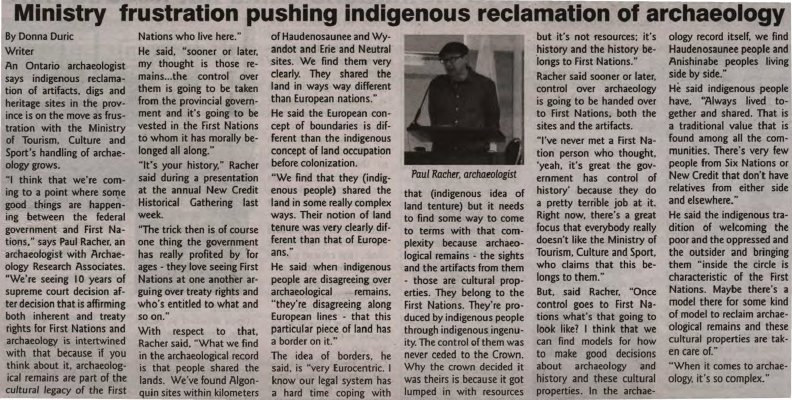"Ministry frustration pushing indigenous reclamation of archaeology"
- Publication
- Turtle Island News, 24 Feb 2016
- Full Text
- Ministry frustration pushing indigenous reclamation of archaeologyBy Donna Duric, Writer
An Ontario archaeologist says indigenous reclamation of artifacts, digs and heritage sites in the province is on the move as frustration with the Ministry of Tourism, Culture and Sport's handling of archaeology grows.
"I think that we're coming to a point where some good things are happening between the federal government and First Nations," says Paul Racher, an archaeologist with Archaeology Research Associates.
"We're seeing 10 years of supreme court decision after decision that is affirming both inherent and treaty rights for First Nations and archaeology is intertwined with that because if you think about it, archaeological remains are part of the cultural legacy of the First Nations who live here."
He said, "sooner or later, my thought is those remains...the control over them is going to be taken from the provincial government and it's going to be vested in the First Nations to whom it has morally belonged all along."
"It's your history," Racher said during a presentation at the annual New Credit Historical Gathering last week.
"The trick then is of course one thing the government has really profited by for ages - they love seeing First Nations at one another arguing over treaty rights and who's entitled to what and so on."
With respect to that, Racher said, "What we find in the archaeological record is that people shared the lands. We've found Algonquin sites within kilometers of Haudenosaunee and Wyandot and Erie and Neutral sites. We find them very clearly. They shared the land in ways way different than European nations."
He said the European concept of boundaries is different than the indigenous concept of land occupation before colonization.
"We find that they (indigenous people) shared the land in some really complex ways. Their notion of land tenure was very clearly different than that of Europeans."
He said when indigenous people are disagreeing over archaeological remains, "they're disagreeing along European lines - that this particular piece of land has a border on it."
The idea of borders, he said, is "very Eurocentric. I know our legal system has a hard time coping with that (indigenous idea of land tenture) but it needs to find some way to come to terms with that complexity because archaeological remains - the sights and the artifacts from them - those are cultural properties. They belong to the First Nations. They're produced by indigenous people through indigenous ingenuity. The control of them was never ceded to the Crown. Why the crown decided it was theirs is because it got lumped in with resources but it's not resources; it's history and the history belongs to First Nations."
Racher said sooner or later, control over archaeology is going to be handed over to First Nations, both the sites and the artifacts.
"I've never met a First Nation person who thought, 'yeah, it's great the government has control of history' because they do a pretty terrible job at it. Right now, there's a great focus that everybody really doesn't like the Ministry of Tourism, Culture and Sport, who claims that this belongs to them."
But, said Racher, "Once control goes to First Nations what's that going to look like? I think that we can find models for how to make good decisions about archaeology and history and these cultural properties. In the archaeology record itself, we find Haudenosaunee people and Anishinabe peoples living side by side."
He said indigenous people have, "Always lived together and shared. That is a traditional value that is found among all the communities. There's very few people from Six Nations or New Credit that don't have relatives from either side and elsewhere."
He said the indigenous tradition of welcoming the poor and the oppressed and the outsider and bringing them "inside the circle is characteristic of the First Nations. Maybe there's a model there for some kind of model to reclaim archaeological remains and these cultural properties are taken care of."
"When it comes to archaeology, it's so complex."
- Creator
- Duric, Donna, Author
- Media Type
- Text
- Newspaper
- Item Type
- Clippings
- Publisher
- Turtle Island News
- Place of Publication
- Six Nations of the Grand River, ON
- Date of Publication
- 24 Feb 2016
- Subject(s)
- Personal Name(s)
- Racher, Paul.
- Corporate Name(s)
- Ontario Ministry of Tourism, Culture and Sport ; Archaeology Research Associates.
- Local identifier
- SNPL004708v00d
- Language of Item
- English
- Geographic Coverage
-
-
Ontario, Canada
Latitude: 43.00011 Longitude: -80.08295
-
- Creative Commons licence
 [more details]
[more details]- Copyright Statement
- Public domain: Copyright has expired according to Canadian law. No restrictions on use.
- Copyright Date
- 2016
- Copyright Holder
- Turtle Island News
- Contact
- Six Nations Public LibraryEmail:info@snpl.ca
Website:
Agency street/mail address:1679 Chiefswood Rd
PO Box 149
Ohsweken, ON N0A 1M0
519-445-2954



